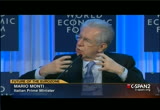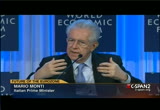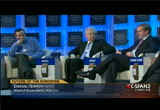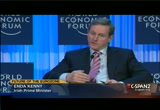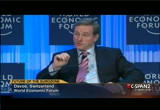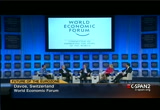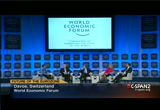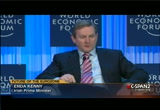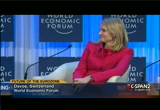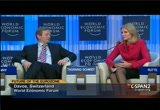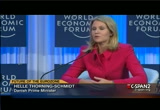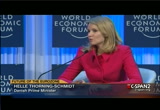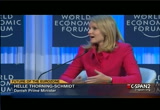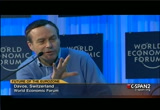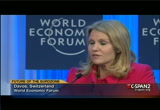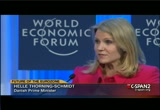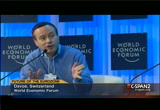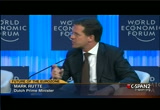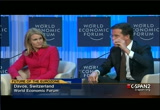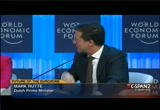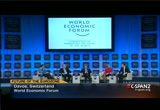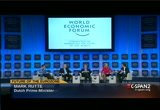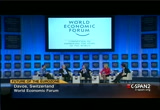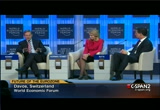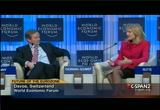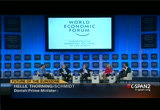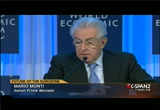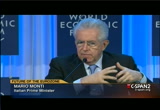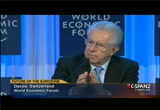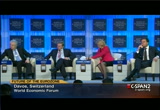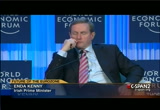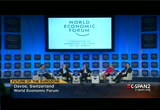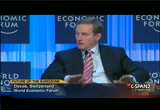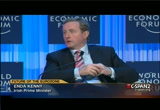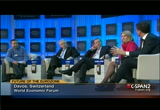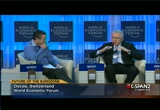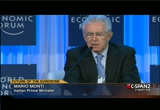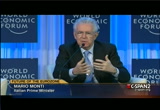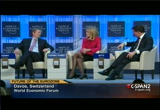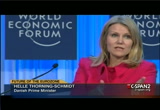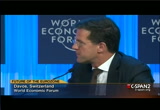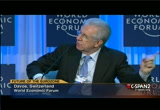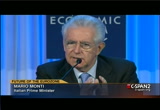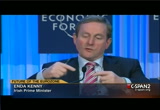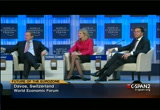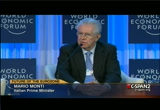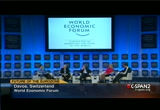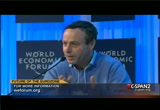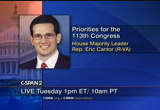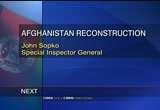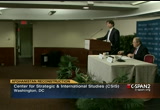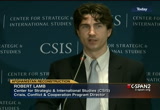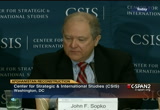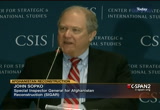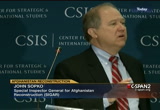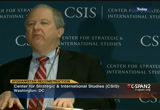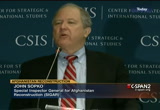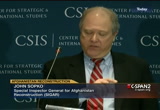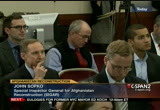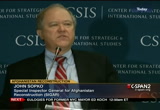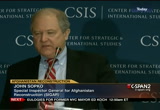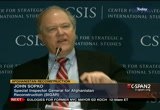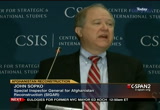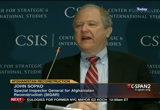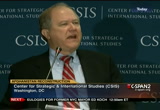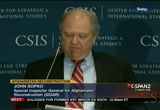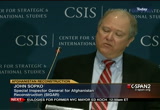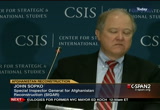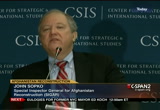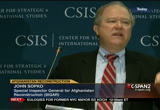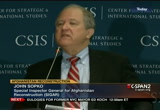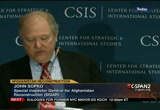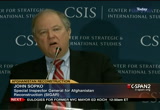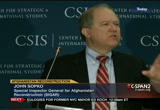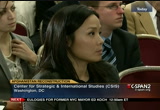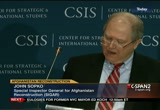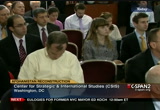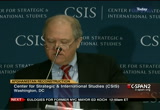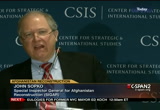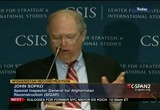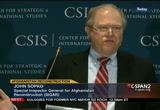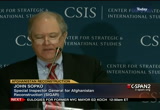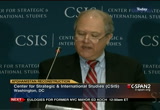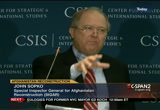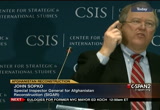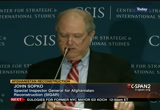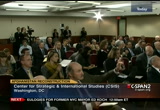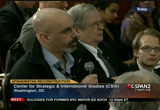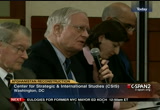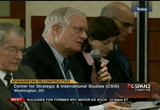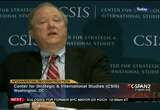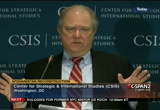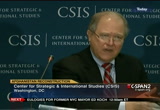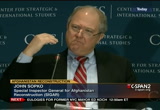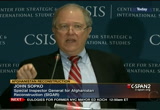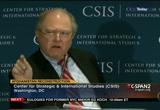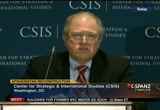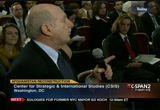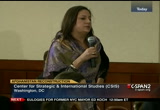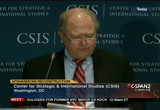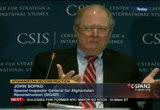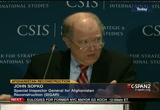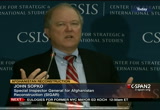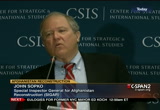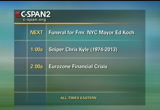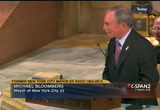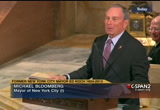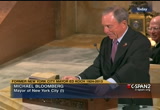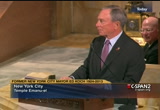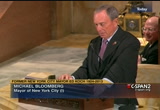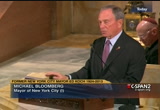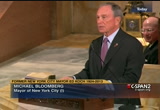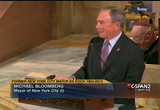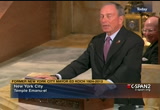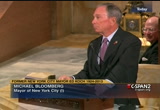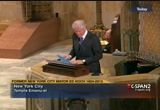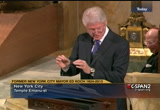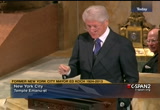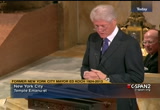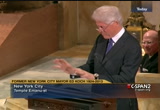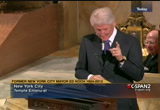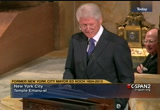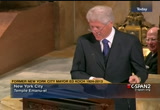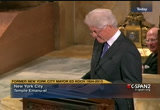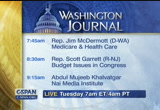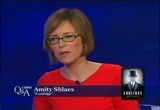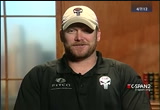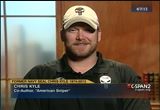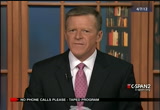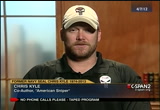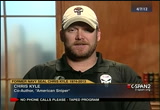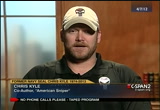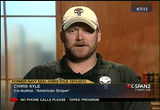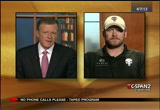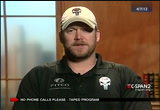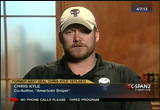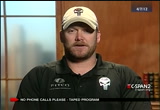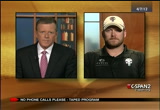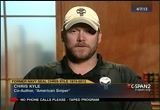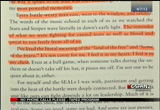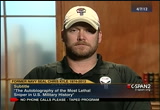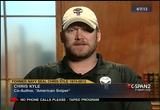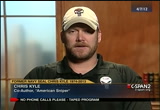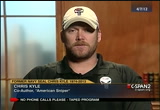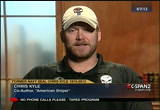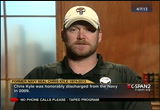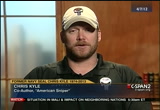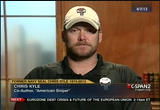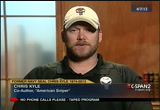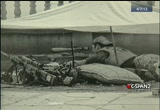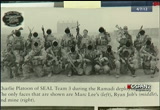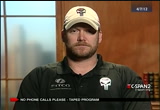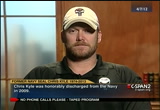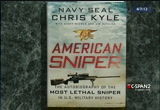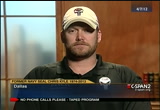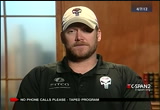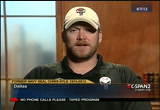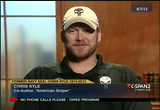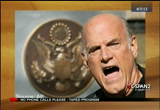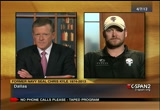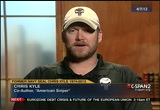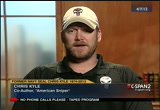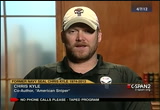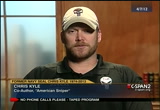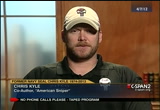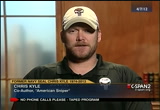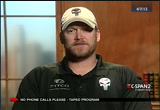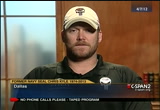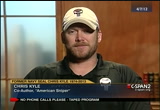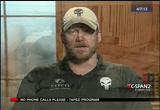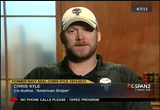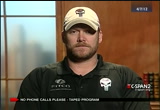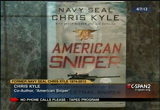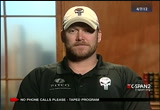tv Capital News Today CSPAN February 4, 2013 11:00pm-2:00am EST
11:00 pm
11:01 pm
in the last 12 months, we have come back to the market. can you tell us a little bit more about the structural economic reforms. particularly repairing the banking system, which i feel is the exemption of growth. >> yes, two years ago when the administration was elected, it actually lasted 250,000 jobs for the two years prior to that. reputation is in shreds around the world. our banks are dysfunctional. there is a complete sense of hopelessness and despair and
11:02 pm
disillusionment. now, gordon was elected with a very keen mind. we have a strategy and a plan that works. the banks are being recapitalize and restructured and have been back in the market as this program began in 2013. there are double-digit figures and our people have had to take really serious challenges. his government made really serious decisions or if it is an example of the government works
11:03 pm
and understands the patience of people, putting up with these changes in the greater picture of things. now, we expect to do better. but we cannot do without the collaboration of the committee of the colleagues in order to do that in 2013, and example of the bigger, european union issue. i would like to say it is important in terms of different countries. there is an example of the analysis.
11:04 pm
the finishing part of that particular situation. moving on to the supervisors and banking unit. because the smallest countries, as you say, we were required to 64 billion as 30% of our gdp to pay for banks. in a situation that has been crushing on the people. it has actually factored in with the situation in a lot of we
11:05 pm
have contact and that is why in this presidency, we want to run this effectively in the interests of all the countries. that is why i would like to see the issues of trade and japan, singapore, canada, all of those associations and i think those are real opportunities. part of this all is here that our leaders, 26 million people unemployed in the european union, millions of young people who do not see their careers as decisions made by politicians. that is the central issue. people have to see and follow
11:06 pm
through the decisions that are made. that is an issue that all of us need to consider in the interest of all of the citizens. if we can continue for the seven years and i hope that you will go to the parliament and discuss that again. they are required to give their authorization and follow through the decisions and make them happen. that is what politics is about. [applause] >> thank you very much for that. you rightly said that it is an incredible result of 60-30 in favor of this, given what is going on. would you like to give mr. cameron some advice on our?
11:07 pm
>> we have had referendums over the last 30 years. lisbon and was then an amsterdam, people in our country understand the difference between the council of the commission and the parliament. they understand all of these things. we have made our decision clearly in the the future of the eurozone and era. our biggest trading partner is european union. britain can remain part of that. but i would argue that many of the issues that arise by
11:08 pm
politicians, from a bureaucracy or administrative point of view, these are things you can change from the inside. that is why i would like to see the digital market become truly singlet. i don't speak for the british government, but whatever happens, i would like to see you that this would remain central to the european union and its future. it's very important that we have a sense for most of the big opportunities arise. >> would be very interesting to
11:09 pm
talk more about this. i'm interested in the degree to which you have a margin of maneuver as a smaller country within this big block. >> thank you. well, first of all, i think this whole christ is the we have been through, and we are not through yet. those who are unemployed, we are not through the crisis yet. this wake-up call should be used in a good way so that it will be a way of taking us through to the other side. this is what we would be learning at the european level, in order to maintain the europe that we want.
11:10 pm
we woke up one we had the crisis. we realize that we lost what we thought was so good about europe. what we need to do in the coming days is to restore all of that. we need to change in a structural way to maintain what we like so much about europe. at the same time, keeping very clear in our heads what makes europe special. what makes it special is that we have a social market economy and we have focused on environment and climate issues. we will also try to make a good basis of that. and all of the other things that make europe special. what we need to do is to change what we feel is our core values.
11:11 pm
we need to do this come as, as i have tried to do back home in denmark. we have done three things. first of all, we have kept an extremely tight budget. we have adopted a budget legislation and we can no longer exceed our budget from here on turn year-to-year. all of this means that we have a very low interest rate in denmark, we have become a safe haven. a tight budget is important. the second thing is to be on a reform friendly. we have performed so much the last year that i don't think it has any comparison in our history. we have performed early retirement, and we have now reformed the benefit system. we are trying to reform the education system. we have been on a big frenzy.
11:12 pm
there then come i feel that this is important. we have tried to bring balance into our budget. at the same time, having a focus on the groups in our society who are most vulnerable. what does that mean? that means that every year we have made sure that the most horrible citizen and something got out of the budget. so we have tried to preserve the quality, which is always a part of the european values as such. the three things, tight budget
11:13 pm
control, and also being focused on preserving what we feel is so important for our equality. this is part of what we need to do at the european level. we have so much to offer. we have so much. this is key for europe and the individual countries in europe that is a very powerful statement. just to clarify, do you think he would be better off being able to do even more than that eurozone club?
11:14 pm
or do you think you're better outside? >> i have always been in favor of denmark joining the euro, and i still am. the interesting thing about the development in europe over the last two years was that we have had different choices. we had a choice between splitting up or separate each other. should the euro countries a stronger together, or should we try to meet the divide between non-euro and euro countries? >> again, we chose the bridge. one thing i am extremely happy about is that every time we are taking a decision about strengthening the euro, all of these things. they have chosen a policy that
11:15 pm
is always euro plus. it means that other countries, some of the baltic countries, we always know that even though we have two different paces, there is an open door for non-euro countries to join in those decisions. an example would the [inaudible] was open to euro countries. that means that denmark might've been the first want one to join it. now, we are discussing a banking unit. the discussion is the starting point that is an initiative. it means that we will have a vivid debate in my country -- that has been some of the most
11:16 pm
important decision. there is always a euro plus, the soonest. it should be taken. >> you did better than you expected, your party. you also represent a creditor country. tell us a little bit about the dutch reform program. what is seeking to accomplish. second, whether you agree that whereas in 2012, it was a question mark that existed about whether a club would lose members were a number. in fact, that is now a federal western and all countries have agreed, including a particularly large one. that the club will remain intact. let me start about your second
11:17 pm
question here. it has been very difficult to take the helm in the countries. in the most difficult is circumstances. there's a lot of stuff to implement and to the fiscal discipline that is necessary. to answer your second question, i believe our aim should be to give all the countries as members of the eurozone -- to keep the eurozone intact. to move to the members, enda
11:18 pm
kenny mentioned it the terms of public finances. we are putting the necessary reforms in terms of social security pensions. obviously, the private sector and nongovernmental organizations. we are working at every level to get the growth engine going again. this has led to focusing on the main sectors in our economy, which we believe will bring us exceptional growth in the future.
11:19 pm
like the agricultural sector. we have the second largest exporter of agricultural products in the world in our country. also, the financial sector, which is considerably comparable. we focus very much on innovation and the research money in our education efforts on these main sectors of the economy. if we would implement everything we have previously agreed, we would have 4% extra of gdp over the next 10 years. he would finally be able to close an agreement of foreign trade with japan. these are enormous figures. somebody asked me how to explain the impact of being a member of
11:20 pm
the european union, in his first being a member of prosperity. sometimes i am extremely frustrated as i know that most of my colleagues. and the members of the european council and all the trouble that we have. we should spend more time on these issues. countries like denmark and sweden, the united kingdom, david has announced his famous friend. we need these countries. the countries and the baltics, some of the other ones, they are focused on bolstering economic prosperity. that is different from what we are having within the eurozone at this moment. i am always trying to alleviate as much as possible.
11:21 pm
obviously, we would be great if europe would join. if not, at least we have a full part of what we are doing together. we need to get that inspiration. >> yes, just picking up on your point, what odds do you think there are, eight out of 10, seven out of 10 -- of a transit -- transatlantic free trade area? >> i think it is possible. to the members of the u.s. administration and barack obama himself, they understand that they are focused in, to be effective in their relationships, they have to work well together. europe is a strong partnership.
11:22 pm
>> [inaudible question] >> i think it will require important adjustments and policies on both sides of the atlantic. it will eventually be done in the time span that you outlined. >> that would be one of the adjustments needed. >> i feel that there is a new sense of realism about europe within europe. the breakup of the euro, exit
11:23 pm
from the eurozone, all of these difficulties. all of the cynics who knew all of the answers had you never had any permanent data mechanism, you will never get to a point where you make it is and it is important. the european council is now moving on. when we didn't support the tax of [inaudible] , because their implications, yet the first meeting, it was the first item on the agenda. the countries that supported this could get out of.
11:24 pm
i think during this current time, we need to start the negotiations for free trade between the eu and the u.s. the greatest trading block on earth, which is the european union, and the united states will be able to understand how this can happen. the u.s. will become an exporter of energy with the changes that have happened there. we need much more focus ourselves. at the end of the day, it is always about jobs and that means injecting growth into european
11:25 pm
economies as a result of jobs that are being created for millions of young people across tiernan and give them hope and inspiration and motivation that politics actually >> one of the things that we should be doing, is to pick the low hanging fruits, and they are out there. we could finalize the trade agreements. we are hopeful that this is what we should be doing. we were so eager to finalize this.
11:26 pm
why is that important? it is important because energy efficiency is cutting edge in terms of using our energy much better and more efficient. we can also make a good business out of that. so i think that we need to focus on the low hanging fruit. we need to do the opposite, which is to use it, and something that gives us a competitive advantage in the global competitiveness. this is what we should be focusing on. this is the very practical approach. we have states of government heads sitting here. this is what we want to achieve. the perspective is enormous. mark was quoting the speakers. jobs and growth in europe is enormous. that is why we need to talk
11:27 pm
about these practical issues right now. >> one more question for the prime minister. this will be an important issue of the campaign -- i was in spain couple of weeks ago. what would you single out? to offer hope to young people who do not have jobs in. >> two things. one is a specific measure. this outgoing government will follow the financial
11:28 pm
contingency. it will provide relief for those hiring youth. a much more can be done in the perspective and we now have a solid public finance situation. secondly, the overall labor market. there we did introduce a labor market reform to inject more flexibility in the labor market. that did not go far enough. why did it not go far enough? because one of them were considerably resisting change. by the way, although they were invited to join and like all the others, they resisted the recent agreement as well on productivity towards more decent
11:29 pm
terms of labor negotiations. so the idea, should i promote it if i should be in a position to do so, is to definitely unite forces that have been dispersed across the political spectrum, so there is more energy behind reforms, including labor market. it has resisted deeper reforms in the area. we have these forces that can do
11:30 pm
more. >> i think we will take questions now from the floor. we will take your questions. we will take this lady or gentleman over there. >> okay, uk prime minister talked about retractor eating powers back to the uk. are there any on the panel that would like to read -- speak up on? >> the governments of the last two years.
11:31 pm
11:32 pm
11:33 pm
commission. europe's new priority of understanding what it is like, means that the collective energy can deal with many of the obstacles of job creation. there are countries that can deal with this before they actually happen. i think europe's research and innovation and education facilities will allow us to do that. we are not concerned with repatriotion, but finding ourselves in a brighter and more
11:34 pm
happy future. we can talk about all of these issues in the context of future treaty change one that arises. >> you might say that i am quite all right. because last thing we want is to be rewriting treaties were changing the flexibility of your tax system. >> taxes are very clear here. our tax is 12 to 5% corporate tax. it is across the entire spectrum. the tax regime in europe in general helps us to make decisions about tax rates per it is clear and transparent. it is generally used by country. our international competence is not changing. >> precisely -- precisely
11:35 pm
because the world is changing, we need to he does. which tasks should be dealt with. i think there should be a debate or example, i would like to talk with my colleagues on the area of occupational health and safety. there is so much that has been dealt with. very much in terms of rules and legislations. it is like hotel california, you can check out, but you can never leave. it is very much at this level. i do not agree when someone asks for specific favors for one country. it should he level at the end of the day.
11:36 pm
both on the european level and the a national level. i agree with david's comments yesterday in terms of making the union more efficient. you should also look at competitiveness. getting the engine going. between the united states and europe, i think it is vital for all of us. >> yes, if i may have a word, i think it is eerie important to have a pragmatic attitude here through the history of european integration. some subject matters are very
11:37 pm
11:38 pm
11:39 pm
>> taking away from the old in order to produce for the young. >> it is necessary for the young that we have sustainable economies. if we just keep going, we are stealing from future generations. it is very clear that we have to have sustainable welfare systems and all of our welfare systems. i want to return to this there has been a lot of action to this there is a big discussion that is being raised. this is a discussion that has been going on for years in the uk.
11:40 pm
we need to keep asking those questions. part of the wake-up call that i was referring to before, we need to wake up and ask if we are spending public money? are we spending the euro in the right way? that goes for members where we are turning every corner to spend the rightly. part of the discussion is that we have to show very clear ideas in terms of spending money and the best way possible. the other thing is that we should do it at the membership level and we should be doing it at the european level as well. >> thank you very much. you know that i do care about
11:41 pm
this decision. just ask each one of you, do you believe that the changes that are going to take place in which will be agreed to secure the eurozone, those changes will require a secondary change. >> no. >> know, possibly to the children of the future. >> now. he can do so much without. >> we will need to do more in the long term to change the treaty changes on this type of membership of countries in the eurozone. i believe that in the immediate term, this changes unavoidable. [talking over each other] [talking over each other] >> this will trigger this.
11:42 pm
i do believe to deal with some of the fundamentals in the eurozone, in the present term, we need to address this. >> ladies and gentlemen, that is to knows and one or two possibles. >> okay, i just put this out there. this is in the eurozone. there are so many changes, the relationship between the out in the end. >> let me say one thing about david cameron's speech.
11:43 pm
do they wish to continue being members, and each country can make a choice. without hijacking the others he i believe people will say yes. as it is, he will have to get out of the market, which i believe that they do not wish to do. rather than hanging on and paralyzing a day you the respect the eurozone.
11:44 pm
[inaudible] clarity, decisiveness, and europe, given its kindness, has an opportunity to move on and make the decisions that we have spoken about with the changes of an impact and the economies of europe. the job prospects for millions of people, which is essentially what politics is about here. we need to have our own perspective inside the eu. and also in a global sense in the coming years.
11:45 pm
food security, changes, climate changes, water, etc. just to be clear, the referendum question has to be in or out. >> that is a question for the british government. >> i think it would be premature to have the discussion. we need to know what they actually want in this discussion. we will choose to find out over the next few years. >> well, i think it is the british government who can decide what it should be. so we have to see what outcome we want. >> i think we have chase that rabbit. >> next question from the floor? >> gentlemen, a lady there?
11:46 pm
>> hello, i am amy kellogg from fox. this is a question for the prime minister. the u.s. needs to make some serious budget cuts in the coming months to avoid the fiscal cliff. both of you have gone through the process of making budget cuts in their own countries. i'm wondering if you can share any lessons learned for the united states as it starts to make its own budget cuts. >> i am sure that they are waiting with baited breath. yes, i would venture to a that it was an effort. a special coalition was put forth of three parties making up 85% of parliament, which in the
11:47 pm
11:48 pm
than normal efforts. >> thank you. advice to the congress, republicans and democrats. maybe even something special for the white house. >> well, i saw the president in march on st. patrick's day. i will say this, we have very painful decisions here. increasing pension age is changing the regulations governing mechanisms. the structures in the areas like health and government. the first thing you need is a plan and a cure. so the people can understand that you have an objective in mind you are objective is to get
11:49 pm
the deficit below 20% by 2015. we are on track for that. we need to pay overtime allowances for agency workers and so on on new year's. the congress and the u.s. government operate differently than government here. the strategy with enough time to achieve that. there is a constant explanation to people as to how you intend to get the. we need european support. in that sense, the united states
11:50 pm
is such a huge country. with such potential. i believe that i think the united states also needs to look at the global positioning because of the impact on the world economy. >> thank you very much. i'm sorry that we are going to have to draw this to a close. i was hoping that the irish prime minister with a a message saying that if you could only get your act together and cure these problems, it would be so much better for europe and the world. but you are way too much of a diplomat for that. [laughter] >> thank you very much. i'm sorry we cannot take more questions. it's been a fascinating session. please join me in thanking the prime minister. [applause] [inaudible conversations]
11:51 pm
>> on the next "washington journal", jim mcdermott of washington, a member of the ways and means committee will focus on a portal to another to me. we will also discuss federal spending with scott, a new jersey republican and member of the financial services committee. and the executive committee as well. "washington journal" of light everyday at 7:00 a.m. eastern. >> on tuesday, eric cantor talking about immigration and health care policy. we will be live at the american enterprise institute here i'm using it here. >> the one thing that we want to remember is that when he left office, the budget was lower
11:52 pm
than what it came in. that is the story for us now. maybe more than 3% sometimes. unemployment is below 5%. the budget was down. how can he make the budget go lower. it helped the economy a lot because he got the government out of the way. >> tracing the life of the 35th president. on c-span's q&a on sunday evening. >> the federal government has appropriated almost $90 billion to rebuild afghanistan. on monday, a report was delivered on u.s. spending, showing the u.s. government spent over $7 million on a largely unused portion.
11:53 pm
11:54 pm
also been at the homeland security office as well. i would like to thank the chairman as well, he was on the senate investigation committee and he has worked at the justice department and today he is the special inspector general for afghanistan reconstruction. we are now entering our 12 year in conflict. as we are all aware, the reconstruction program has not always gone as desired and as
11:55 pm
expected. we have rotating military into afghanistan today. many thousands of troops are on the ground. and we have what is expected to be no a more rapid troop drawdown from afghanistan over the next two years than any of our military planners and reconstruction officials had hoped for or expected. he has just published the quarterly report 2013. and we look forward to hearing what he has been fighting in afghanistan. what his views are on the future of reconstruction. >> thank you very much.
11:56 pm
it is a pleasure to be here. i have to apologize, to start with. those of you that have been in afghanistan, i appreciate your service. it is an honor to be here at this event. i see old friends of mine. sam has been a tireless leader since 2000. in many ways, those 15 years that i spent preparing for my
11:57 pm
11:58 pm
improving the united states government. it has been only seven months since i was appointed by president obama is the special inspector general for afghan reconstruction. since that time, i have traveled twice and i have traveled in and out of government. many of our nation's policymakers and prestigious think tank experts, including many here in the audience. i have learned a lot about our government, we have a coalition what we have. let me tell you a few minutes about this. it is not a well-known
11:59 pm
organization. it is not something you smoke either. it is the only agency in the tired united states government whose mission is reconstruction in afghanistan and nothing else. it is unique in that way. we have unique authority to examine any project by any government agency operating in afghanistan, dealing with reconstruction. so we took the department of defense, the department of justice, and the agency operating in afghanistan. we have the largest oversight presence on the ground in afghanistan. we have the most aggressive program in afghanistan. and we have the most successful record of working with afghan law enforcement in prosecuting individuals in afghan courts. we are a temporary agency.
12:00 am
12:01 am
i tried to visit afghanistan every quarter. everyone there, can assure you, in the embassy in the military is intensely focused on the difficult task of transferring security responsibilities to the afghans by the end of 2014. equally interested and concerned about strengthening the afghan government ability to manage the country's continued reconstruction efforts during this transition timeframe and beyond. i think it is fair to say that the success or failure of our entire investment in afghanistan is teetering on whether these to enter related and ambitious goals can be met. i have a little doubt, especially from speaking to all of the major leaders from my latest trip that the men and women responsible for taking on this challenge are acutely aware
12:02 am
of that situation. likewise, the newly installed 113th congress have the responsibility to ensure that the next stage of our nearly $100 billion decade-long reconstruction effort is properly directed toward those activities and projects that will have the greatest opportunity of long-term success in light of my role as the special inspector general and our unique mission and mandate, today i want to pose to you a set of seven fundamental questions that i believe need to be asked of every ongoing and planned reconstruction project by both congress and the executive branch in order to ensure their success in the ultimate success of our mission in afghanistan. the first question is, does that project or program make a clear and identifiable contribution to our national interest or
12:03 am
strategic objectives. the second question, the afghans want those programs or projects and need those programs or projects? the third question, have those programs or projects been coordinated with our allies, with the afghans, and internally with our own government. the fourth question we must ask, the security conditions permit effective implementation and oversight of those projects and programs? fifth question is, do those programs and projects have adequate safeguards to detect, deter, and mitigates against corruption, which is endemic in afghanistan. the sixth question we need to ask is do the afghans have the financial resources, the technique of capability, and the political will to take those
12:04 am
programs and sustain them in the next decade. leslie i have the implementing agencies established meaningful measurable metrics for determining success. are they a plane into their own programs? barrell, to many of you in the audience these questions seem simple. in fact, they are. but unfortunately, what we have found in our work and what the other inspector general's of town in their work is that they are often ignored by those designing and implementing our reconstruction programs. i would like to take some time in the rest of the speech to explain why i think these questions are important, discuss what our work in the work of the others are doing about them and share our plans for using these questions in the years to come
12:05 am
as we look at reconstruction in iraq and iran. the slick that first question. to the projects and programs make a clear indefinable contribution to our national interest or strategic objectives? as you're well aware, that state's primary goal in afghanistan has been to prevent afghanistan from becoming, once again, as safe haven for al qaeda or other terrorist groups to launch attacks. our central tenet of the united -- u.s. campaign has been the counterinsurgency or corn strategy with its three primary phases of clear, hold, and build. however, our work has found instances in which reconstruction programs have failed to achieve this intended benefit, and in some cases have actually resulted in an adverse effects. in april of last year, for example, we released an audit report on the local governments in community development program
12:06 am
or elegy cd program. the u.s. agency for international development had touted as the flagship coin program. the primary goal of that program was to create in partnership with the afghan government, a stable environment for long-term political and economic and social development. however, as reported, the program had not met its primary goal of extending the legitimacy of the afghan government, nor had it brought the government closer to the people, nor had it foster stability. in fact, my auditors found that each of the eight provinces was -- with the most elegy cd activity experienced dramatic increases in all of love violence between 2006 and 2010. although the effects of the algae cd program on security levels cannot be isolated, a
12:07 am
useful indicator of stability. certainly suggesting the program was not achieving its intended goal. likewise, in july of last year we issued a report on the afghan infrastructure program which congress created to leverage and coordinate the department of state, the part of defense, and aid resources for large-scale infrastructure projects in afghanistan. we found that five of the seven fiscal years 2011 projects were behind schedule and that some of these projects may not achieve the positive "effect for several years, if at all. we also identified some instances where the project resulted in the adverse effects because the weather created an expectation gap among the populace or lacked citizen support. now, sigar intends to conduct more assessments in the upcoming
12:08 am
years, including an audit that we will initiate soon on the stabilization in key areas program which is $177 million community development program. likewise, we intend to increase focus on that second question that should be asked for each reconstruction project, and this is common to the afghans wanted to anthony? now, you would be surprised how often we find that the answer to this question is now. let me give you an example. a few days ago that as many of the pro gasol and the press released an inspection report on the $7 million border facility. what our inspectors went to visit, they found it was sitting unused. although the facility was built for 175 troops, there were only 12 afghan personnel on site and
12:09 am
no one was short among them whether the site was going to be used. moreover, our inspectors could not even access most of the buildings, because there were locked in a border police personnel presence did not have keys. that is a bit of good news. as a result of our inspection the combined security transition command under the general responsible for these projects agreed with our recommendations to reassess its plans in determine whether construction contracts in be downsized or facilities eliminated or redesigned. think this is a great example of our work can lead to a tangible improvements, and i am especially pleased with the continued corroboration of the general and his team in attempting to improve the efforts on reconstruction. now, let me turn to another troubling problem, which is in
12:10 am
our third question. has the program or project been coordinated with other u.s. implementing agencies with the afghan government and other international donors? the border police facility i just mentioned is certainly an example of poor coordination with the afghan government, but let me give you an example of poor coordination within the u.s. government. in 2011 sigar conducted a thorough effort to restructure the financial sector and safeguard funds. we found that even though the board and the defense and a program of common security were working with the same afghan banks, neither agency was aware of the other's efforts. in addition, the department of homeland security had not been included in important interagency working groups designed to coordinate efforts to gain visibility over cash flow.
12:11 am
as we reported, limited interagency coordination with u.s. isn't -- u.s. agencies at risk of working at cross purposes and definitely not benefiting in leveraging existing relationships. the next question i posed is particularly important for k-9 because it impacts us almost as much as it impacts the agency implementing reconstruction , and that is whether security conditions permit effective implementation and oversight. now, of all the u.s. combat role schedule to in the december december 2014, the withdrawal of u.s. troops as well under way. u.s. and coalition forces have already pulled the the number of locations in afghanistan leaving some of those places too dangerous for us or the implementing agencies to visit. now, some of you may have heard a term called the golden hour.
12:12 am
this refers to the policy unique to only u.s. forces and only in afghanistan which in essence says that the military will only provide security in areas within an hour of a facility that can provide emergency medical care. the safe zone or bubble around those medical facilities extends about as far as a 20 minute helicopter ride. now, as the troops continued to withdrawal, the amount of territory inside afghanistan that falls of sight of these bubbles will increase. accordingly, the number of u.s.-funded projects and programs that can be monitored and overseen by u.s. personnel will decrease. if we cannot give out to review a project or inspected facility, it is highly unlikely that the
12:13 am
agency's funding them can do it either, whether it is an agency with the part of the state, the operative defense, aid, the department of justice, department of the agriculture, or any other of the married a u.s. agencies operating in afghanistan which means that more reconstruction projects exist with no direct u.s. oversight. now, we have already seen the effect of security limitations on the reconstruction effort as well as on our own operation and that of our colleagues in the oversight and law enforcement community. for example, reported 2011 that the world bank had not conducted site visits outside of trouble to monitor the activities funded by the multi-billion dollar afghanistan reconstruction trust fund because of security concerns. security restrictions are not limited to the world bank. just recently one of my inspection teams was told that a location in northern afghanistan
12:14 am
, beyond the golden hour, beyond the security bill and therefore deemed too unsafe to visit. as a result, we are unable right now to inspect 38 facilities worth approximately $72 million. i want to take this opporunity to personally thank the operations and the command of colonel j. r. bass and the fourth alabama national guard who with task force centurion prime has done wonderful work supporting this in not only northern afghanistan and elsewhere in the country. even they are limited by the security bubble. no, it even their rear finding we can always get the protection we need to conduct their work. although it is clearly within the oval, the embassy regional security officer has informed us that because of limited resources it is already becoming increasingly difficult to
12:15 am
support all of the requests for movement by u.s. personnel in the area. now, despite these restrictions they're committed to forging ahead, even under the most severe conditions. i'm very happy to give, as an example, just recently i learned that two of my agents went out into the field to inspect a particularly dangerous stretch of road as part of there criminal investigation into a contractor's failure to build systems designed to prevent insurgents from placing explosives and co routes along the road. my agents were surrounded by heavily-armed u.s. military units who protected them as the agents literally ran down the road from culvert to culvert inspecting and autographing to see if there was a covert protection device there and if it was adequate. am happy to announce that ellen was in afghanistan those agents were able to arrest, with afghan
12:16 am
participation and the afghan government is charging the contractor who was involved in this with crimes related to the fraud committed upon the government and the negligent homicide of two u.s. personnel. we are developing alternative ways to conduct oversight into afghanistan's evolving security environment. for example, we have local nationals on our staff who are not subject to the same security restrictions that our american employees are. in some cases we may have to rely on them and are exploring the use of your special imaging to assist our oversight. finally, we continue to cooperate and work with our other inspector general's office is there to see if we can combine our activities or come up with best practices to do oversight. these tools are helpful, but they are not perfect. the golden standard, the gold standard, i should say come on oversight, is a u.s. government employe you trained to do
12:17 am
oversight going and inspecting the site, inspecting the records, kick attires. but unfortunately we may not be able to do that for very much longer in afghanistan. but i am particularly grateful to ambassador coming in and general allan for their continued expressions of support for our work. both promised me during my latest visit that they would insure that our people would be able to access the same locations that their people can access. ultimately you can see the question is how far will their people be able to access? well will they be able to see? of far will they be allowed to go outside of the bubble? i fear many of our programs will be exposed to increase risk of theft and misuse, especially as we continue to use direct or on budget assistance to the afghan
12:18 am
government and especially if we do so without imposing strict preconditions on the afghan government to permit effective oversight of these funds by u.s. personnel. the next question i posed deals with a different but equally significant problem, namely corruption. the reconstruction programs and projects developed and planned to include adequate safeguards to detect, deter, and mitigate corruption. now, afghanistans reputation for corruption is deep-rooted and widespread. i don't have to devote too much time to that. a recent survey found that 60 percent of the afghans believe that corruption is a major problem and even more believe that it is a major problem on their national level. in example of some of the work we had dealing with corruption is one that our office of
12:19 am
special projects recently reported on dealing with currency counters in the international airport to count and track cash flows out of staff to cut out of afghanistan. estimates of cash taken in any given year rsi as for the half billion dollars. however, although the currency counters were purchased by the united states government and installed in 2011, we found that the afghan government has refused to use them. even worse, those identified by the afghan government as vips or in some cases the vips are allowed to bypass all controls at the afghan airport raising the risk of money-laundering in both cash smuggling. the afghan government acknowledged that corruption is a significant problem and has made commitments to curb it. the july 2012 international donors conference in tokyo led to a set of mutually agreed principles that include
12:20 am
incentives for the afghan government to carry of commitments to combat corruption unfortunately, we are concerned that not enough is being done quickly enough on these principles and particularly developing specific benchmarks. it is now almost eight months since this landmark agreement, and we still have not seen any concrete bench marks. if not now when will we see them? i can tell you i will shortly be putting the agencies on notice at polk -- had both congress and the american taxpayer need to see concrete steps in place to ensure afghan government progress to combat corruption and improve governments. if this is not done immediately i fear we risk the loss of u.s. and international donors support for ongoing reconstruction.
12:21 am
no, corruption can also undermine the sustainability of reconstruction programs, a key concern for the u.s. and our international donors which leads me to the next in our series of questions. the afghans have the financial resources, a technical capacity, and political will to sustain the reconstruction programs we are funding in turning over to the? through our audit inspection work we have identified numerous examples in which the uranus' states created a program or build the facility without consideration as to whether the afghan government could sustain it. october 2012, for example, we reported that the afghan government will likely be incapable of fully sustaining the nsf, afghan national security force facility after the transition in 2014. we found their lack personnel
12:22 am
with technical skills required to operate and maintain critical facilities and that the afghan government had filled less than 40 percent of authorized operation and maintenance positions. likewise, in 2010 we audited reconstruction efforts and found that the afghan government was severely limited in its abilities to operate and maintain u.s. completed development projects in that province. as a result, we found many projects have become dilapidated or in this respect -- is preparing to the number of projects that have been completed and the commanders emergency response program. in regards to that program we were particularly troubled by statements that some senior officials told us that they did little more than check the box in the project files to indicate that the governor of afghanistan agreed to fund it sustainment of those programs.
12:23 am
a logical result of such policies is a waste of u.s. taxpayer money. by building infrastructure were developing programs that the afghans will never effectively use. my seventh and last question is this. the implementing agencies established real metrics for measuring success and are they using them? too often we find that the agencies are focused on the couplets, not of comes. for example, they are interested in how many teachers a trained, schools they built, kilometers of road they built, culverts the bill to, but not on what is the result. is there any results from doing that? these metrics give us a part of the picture, but they do not truly give us meaningful assessments of whether programs have achieved their goals.
12:24 am
for example, we assist efforts to build the capacity of the afghan ministry of agriculture to better serve farmers and promote private sector development. unfortunately we found that the u.s. embassy could not determine how much present in may from the project because all they had done was measure the products of capacity building efforts such as the number of research stations that have built, the number of research stations that had been rebuilt, the number of clubs that have been built or rebuilt. rather than the results achieved by the construction. now, as we proceed with our audit work we're going to be increasingly looking for ways to go beyond the stated output metrics to assess the impact. what did a project or program actually achieve? if we cannot answer that question now 11 years into the conflict, why did we spend the
12:25 am
money? at the end of the day, the american taxpayer needs to know what the u.s. reconstruction effort has accomplished, not just up with, what is the outcome of all that money spent in afghanistan. so, those are are seven simple, but we think critical, questions to the extent that agencies can answer in the affirmative to them we believe that a project or program as a better chance of achieving real success. but if, as in the case of the afghan in the structure program with the border police facility where the currency counters to the agency's pending a reconstruction dollars fine that the answer to these very basic questions is in the negative, no
12:26 am
it is time for them to reevaluate continuing or starting a project or program. now, i pose these questions, and a particularly pose these questions in the quarterly report we just issued last week because we are troubled now because we have been told that some of the agency's operating in afghanistan may be poised to of the gate as much money as they can as soon as they can afford the troops drawdown takes place. if this happens, without first assuring that we answer those questions in the affirmative we are likely to waste billions of taxpayer dollars. likewise commend is incumbent upon the congress to also keep these questions in mind as they review a new authorization and appropriation. and as i mentioned, congress
12:27 am
needs to assure itself that the almost $19 billion already appropriated but not yet obligated, not yet spent only be spent if they have evidence that the project meets the seven requirements. now, obviously we recognize that there may be projects that do not need any or all of these seven questions. that still need to be funded because the potential benefits clearly outweighs the inherent risk of failure. but if that is the case, the implementing agencies need to clearly articulate the reasons for doing so, for taking that risk. and congress needs to hold those agencies accountable to that explanation for why they took that risk.
12:28 am
now, in conclusion, we are about to embark upon dramatic dark -- drawdown in triple. the same time we're poised to turn over to the afghan government and the unprecedented amount of buildings, projects, and funds with the hope that they can manage them effectively this is a risky endeavor, and i believe that strong and independent oversight needs to be an essential part to of such a withdrawal plans if reconstruction activities are to succeed. at no other time in our decade-long struggle afghanistan has reconstruction really been so critical to our ultimate success actually as our military goal that we see. the next two years and beyond,
12:29 am
what some call the decatur transformation will really be the decade of reconstruction. therefore, congress and the executive branch need now to conduct a thorough re-examination of reconstruction issues, programs, and projects. we've that sigar look for to the challenge ahead, and i can assure you that we are also committed to the success of the military drawdown and closely working with the implementing agencies to ensure that we embark upon this next critical stage in the afghan reconstruction and ultimate success. thank you very much for listening. thank you. i am open for questions. [applause] >> thank you very much. i am sure there are a lot of questions from the audience. i would only ask that those of you have a question please raise your hand. with the microphone because here
12:30 am
live streaming in recording this event in the question will not be heard if you're not have a microphone. please identify yourself and make sure for the brief question rather than a speech because we all a lot of questions and a lot of interests and to reflect a seven -- leave enough chance for mr. john sopko to answer them. after questions here, and that i will take to questions at a time. >> thank you for the talk. of those seven questions you asked, i think it would probably be difficult to get an affirmative response for any of those seven for most of the projects we do. however, the folks that implement these projects, they say there are intangible drilling off -- benefits that don't demonstrate metrics on the back end. i would ask first part, our other intangible benefits you can track and not have to tie everything with quantitative but if it's on the back end, even if
12:31 am
their results based. the second part, ostensibly switching from counterinsurgency to security forces and how does that affect your inspection efforts? >> in your first question and in all of your talk you refer to programs, but never to plants. in one of the issues is how you make trade-offs and do you have a coherent way to move forward? i wonder why the focus on programs with no licking it plans when the afghan government estimates it will be cut in 2012 to under 800 million in 2014, even if you get the program tried to me if you don't have a plan. similarly in your own report when you looked at the transition plan, there is no
12:32 am
plan. there is of the transition. they did not talk. debt is question number one. the other refers to measures of effectiveness. he referred to the lack of the measures of effectiveness being issued. the fact is, of the measures we are using don't really make any sense like education data which ignores the actual computer spread and the gatt between the data and reality. you have gdp data in the report, but obviously no dejected to see if the gdp per capita data you're using tractor and international organizations which have a 21 difference. if we don't actually check the sources for measures of effective, does it do any good to have measures? [laughter] >> okay.
12:33 am
where should we start? >> microphone, please. >> show. >> press that. >> not technically capable. let me try to deal with the first question. i would get to the multi part question. on intangible benefits we do recognize there are some intangible benefits. excuse me. if there are intangible benefits for poor or policy they should be articulated and we should find has begun to the audit. i recall when innocents are redoing an audit, but our purpose was to do this and this. well, we ask you why you're doing it. you give reasons for why you are doing this program to congress. we took what your justification was and then apply it, particularly will we reluctance of vip programs. intangible benefits that we
12:34 am
could not enumerate, but that is not what he told congress the u.s. for appropriations. to some extent let me explain a limitation on us. add on to policy. that did not do military policy or tactics. we don't to foreign policy or tactics. we try to look at the process. if you say this is your program, this is your policy, this is the reason why you're doing it and receive it is done correctly, do you mean when you articulate is the reasons for doing it. i hope that answers that. we do recognize intangible. we do recognize that, and as i said, in the presentation, there may be programs that will not meet any of these questions, but still, we should do them. if so, articulate why. tell the taxpayer, tell us when we come by looking at the project. turning to the doctor, and i
12:35 am
hope i get all of the res ponces. we are looking. i apologize the shortened it. rio achaean saw the planning. i'd agree with you. we're having a problem finding out what can the planning is going on. trading the speech is the kind of getting people into we hope you're doing the planning and when you are you keep these questions in mind. i was just seven afghanistan asking why you're planning. can you show us the plans? rihanna seen them. we assume they're there. we're told they're there. we had not demanded an. each of my sister ice these are looking at the planning process. looking at that site. it will be looking at their planning process. we will be looking at the planning process overall and its impact on the construction, so we're looking at the planning.
12:36 am
is the lending good, and of no. that is what i wanted to highlight the one particular problem i had, and i had seen this year's. i am not surprised. and that is, this matter rest to spend money. plans be damned. we just going to get this money -- that money out the door before the clock strikes 12, and that is my fear. there is no planning. you are just pumping the money out the door. as we're concerned about. now, you talked about the measures of effectiveness, our data. i'll be quite honest with you. some of our debt is part win the right. we get from the government. now, i know, okay, and from the government. we put out one of the most massive data calls of any u.s. agency every quarter. of staff. in the actually asked the
12:37 am
quarter's men and anyone else commit a freer and asking for the right data, please tell us what to look for. they extend that offered everyone. if it is a reasonable request, we want the data because part of the mandate : the damage in this project about sigar, required not twice a year, but four times a year to do this massive the call, and if you look in our quarterly report, three-quarters is reporting the data in trying to put some reason behind it. you go to our quarterly report. it should be the one source, one-stop shopping for a formation of afghanistan reconstruction. now, their problems? yes. that is why we foot know where we get it. you're right, some of the data in our u.s. government is using is not the same bitter the world bank is using, not the same data being used by other airlines.
12:38 am
we are particularly concerned. if you looked at the last three quarters. i have only been there for three-quarters. the first time i sit down and looked at the quarterly report. the kuna unocal rescission of the data we reading of the effectiveness of the afghan national security forces, you had guns and i had doubts, and that of my people to start pulling the string. this is where it's very useful. i hate to say this. i rely annual in the community here in washington d.c. and elsewhere who study these issues because you have the equities. we are just accountants, investigators, and the use the old line in my staff aide. and just an old poor country lawyer. we know how to do over such investigations, your the experts. going back, you said there was a question. i thought there was a duffel question. we have been pulling the string. you will see in the latest, the concerns of the second report. we have now raised again, and
12:39 am
we're going to actually dig into find out what is behind the numbers. basically it looks like -- and we don't know for sure, but we will pull the string. it looks like our data on the force of the afghan national security forces that we will be relying on would be of use. we don't know what supports it. so we're going to be pulling the string. i agree with you and hope that answers the question. we're open to any suggestions as well as in the criticism of our data. who like to make it as part, thorough, and deep as we can, but can only rely on and if we don't get the data i suppose i can subpoena government agencies, but i can send a nasty letter to their bosses saying they are not helpful. you will try to get as much data as the cancer that policymakers on the hill in in academia have the of formation to help gasol
12:40 am
judge and understand and improve our reconstruction. >> to more questions in the front. >> mark snyder, international crisis group. this is sort of a follow-up to his question. when you look at the milestone rating definitions for the nsf, one is that they are unable to -- that they have -- the department should not exist, but they can accomplish the mission. the second one says that they cannot accomplish the mission with a significant coalition assistance. that one affects many of the entities within the ministry of defense and interior. i guess my question is, have you looked at the downward trend
12:41 am
which is providing assistance and whether as you move toward 2014 many more of those entities without assistance will be unable to accomplish the mission and therefore unable to provide the security that we can structure requires. >> the second question is over here. >> hi, sir. i return from afghanistan a few weeks ago. >> please identify yourself. >> sonship. i don't wish to announce by affiliation because this is a question based on experience. you have termed results and impact, but it is not clear whether your running and the difference between that and the
12:42 am
ultimate impact on how the afghans perceive the legitimacy of the government which i think is our ultimate goal in our activities in a country. and so without a clearly stated set of in state rules are however i'm not sure how you can announce the implementing partners to be responsible to what you're asking. i just want to clarify, are you asking -- are you auditing or are you monitoring and evaluation of our ultimate impact? >> thank you. >> let me start with the ansf question. and this is a partial answer to my think, also, to the second question. although we have the largest
12:43 am
presence in the degree of taken the lead of reconstruction, there are other inspector general's working. so we try to coordinate our work with the dod, state and and the inspector general. the specific question u.s. about capabilities is being looked at. a real looking at the numbers and how we -- our process for raging, and we have raised comes it -- some concerns even before i got there about what is the standard reusing. we have basically carved out in conjunction with the other ids looking at the support. let me just back up for a second. the way the statute has been defined, reconstruction include support, training, bullets to
12:44 am
mike gunn, building bases and all that and salaries of the ansf, so over 50 percent of all money is really going to the ansf. so the answer to your question, there are looking at that. it may be best because that is the territory that they've decided to look at. a year looking a lot of the support, fuel, actually doing something on the weapons, looking a literacy issues, trading issues, and we're also looking at the numbers and where they get the numbers of how many troops are actually there and how many have been deserted mon-khmer many -- double counting. so we will be looking at that in more detail. it is an important area because there are 50 percent of
12:45 am
reconstruction. if you don't have security the question of governance, the question of reconstruction pales in comparison. the me turn to the legitimacy of the government. that is a big question, one of those policy questions. is the government legitimate. we're not asking that. really in specific audits of programs and policies and procedures. the program is supposed to support or promote the legitimacy of the government's those are the stated goals and our government has set for this program. you'll take the stated goal and got it against. in the case of one of the programs of was supposed to bring the government closer to the people and insure greater support for the central government, i think i refer to one of the audits with the tenants said, we cannot really make certain that you did, but violence went up, so we are not certain you accomplish your goal
12:46 am
i think your question is the penultimate question, which all of our work and the work of the many angie's me answer, and that is concerning the legitimacy of the government. i hope that answers the question. >> thank you. any final thought suicidally was with iraq. >> it is something a picked up when i was in afghanistan. people keep this in mind. december 2014 is not the end of the world. it does not end. afghanistan will be there. the afghans will be higher. we will be there as far as we can tell and tell congress tells me differently. not only weak meaning the u.s. government and assistance per ramps but i think sigar will be aired. and we hope to work very closely with policymakers as well as the emblem mentors to insure that after 2014 we are successful because we think the next time
12:47 am
is really the most important for reconstruction. thank you. [applause] >> thank you for your words and for your time today. thank you, everybody, for coming. this video will be posted on the website. please go back and check. thank you for coming today. [inaudible conversations] >> coming up, eulogies from the funeral for former new york city mayor who died friday at 88. then, a program with former u.s. navy sniper who was killed saturday in texas. followed by the prime minister's discussing the year -- the future of europe.
12:48 am
>> on tuesday congressional budget office director rid of these is the disease 2013 budget and economic look. live starting at 2:00 p.m. eastern here on c-span2. also at 2:00 p.m., a bipartisan group of house members unveiled and trafficking legislation. you can watch that live on our companion network, c-span three. >> she said in her memoirs it was like a bright and beautiful dream. the most wonderful time of my life. the event that gives you some idea of how much she enjoyed being first lady in death she thought that her husband had finally achieve the recognition he deserved. >> historian on julia brand who married her brothers and west point roommate ulysses s. grant. first ladies, influence and damage, public and private lives, interests, and influence
12:49 am
on the president's produced with the white house historical association preseason one begins present state of your 18th at 9:00 p.m. eastern and pacific on c-span, c-span radio, and c-span.org. >> new york city mayor michael bloomberg and former president bill clinton spoke monday at a funeral for mayor. he served three terms as the city's mayor from 1970 to 1989 dive friday from congestive heart failure at the age of 88. this is 20 minutes. >> to you and the entire family i come today with the love and condolences of almost eight and a half million new yorkers who are grieving with you at this moment, although aid has to be loving all this attention. and i was particularly thrilled that he picked my neighborhood quarter shore for his sendoff.
12:50 am
president clinton, governor cuomo, pataki, spitzer, schumer, gillibrand, city and state, federal and irrational officials and dignitaries, friends, family, and fellow new yorkers, everyone is here today. the thing there is no doubt that it is looking down on all of us assembled here be amended think it is fitting that he picked this place just a few blocks from a certain east river span. before last year's state of the city speech if you remember we ran a video and included a shot of ed standing at the entrance ramp yelling to all the cars approached, look into muybridge, will look into muybridge. needless to say it brought down the house. but most people don't know is after the cameras stopped rolling end stayed out there in the freezing cold for another 20 minutes yelling welcome to muybridge.
12:51 am
he loved it, and we loved him. now mayor, i think, as ever embody the spirit of new york city like he did commander don't think anyone ever will. toughens loud, brash and irreverent, full of humor. he was our cities quintessential mayor. more than anyone else, he knew the new york was more than a place, a state of mind, an attitude. an attitude that he displayed to the world every day, and we had such respect for him because of his outsized personality and that it was matched by his integrity, intelligence, and independents. i was lucky enough to get its endorsement in my first run for mayor, one of the few people crazy enough to back me. was it politics, did not know a thing about it. but have always robber devices gave me. he said, be yourself, so would you believe to rancho worry
12:52 am
about what people think. god knows, he did not worry about it. he was as genuine a politician as america has ever seen. he understood that if it takes tough stances they will respect you for being honest, you know when they don't agree with you. that scares the hell of a press secretary's importance of consultants. the average citizen in new york really admires it. a gifted student of human nature, but he was also a devoted student of government policy. he had a voracious appetite for information and his colorful candor sometimes overshadow the fact that his opinions were informed by tireless study of the issues. over the years many people turned ted for advice, including me. no one understood the job like he did, and no one was more eager to talk about it. always available, always direct, always wise.
12:53 am
i remember the time were talking a lot of attack obesity. he said, limit the size of sugary drinks and a will notice. [laughter] and then there was the time he told me, the meager place great. but tonight to you. actually, shortly after he was first inaugurated he said, i'm going to act like a one-term mayor. as a result i will be a three term mayor. he knew from the beginning of the key to success lay in throwing political caution to the wind, and it is easy to forget just how badly are city needed that kind of leaders because the new york that it inherited is almost unimaginable today. miles of abandoned buildings, salty streets still unsafe to walk in daylight monzonite and municipal government that was
12:54 am
broken and had stopped functioning. the south bronx and other neighborhoods look like they had been bombed out an air raid. new york was in a state of despair and decay. for the first time in our long history the whole city seemed to be in terminal decline. new york has always been a magnet for people, a place of gross -- growth and progress. the place where the future comes to an hour division. in the 1970's that have ceased to be true. it held up his hands and shouted enough. we will not accept this. our best days are still ahead. convincing us that we could be great again. he reminded us of why we love new york and inspire us to fight for it. he invested have tougher problems were, because he had the confidence and courage to believe that problems could be cured he not only arrest the
12:55 am
decline and not sure that this a release he was governor will come not only restoring the city's fiscal health and me this once again the nation's economic engine, he was not only building affordable housing where fires that raged, not only made new york city once again and national equal rights and art and culture, he did something even more important. he restored the ark of our city's history. a decade before he became mayor we lost our waste. thanks to him we became great again. let me tell you, that was not inevitable. he made it so. it is fair to say that the city we know today would not exist without them. everything that was accomplished has been built upon the foundation that ed laid. a foundation that is as strong and unshakable as eds faith in
12:56 am
the genius of duty of the york and his faith in god. you'll be happy to know, i have been doing my biblical research and think it is only fitting that this portion is about moses leading edges of bondage in egypt. now, ed in his own way was our moses, just a little less there. he led us out of darkness and give us hope. while he may not have parted the red sea, he did break a subway strike by standing in a bridge and shouting words of encouragement. and just as moses died right before you reached the promised land, and dies hours before the documentary about an open in theaters. leave it to ed to find the best way to maximize publicity for a film about his life. no one ever enjoyed the theater politics more, and no one, no one was ever been arrested. and as much fun as it was to watch him as mayor, the real
12:57 am
show began when he left public office, lawyer, author, professor, television judge, movie critic, a restaurant reviewer, political commentator, reform organizer, twitter user. even a radio host. oppress and politician ever stop asking for is opinion, and so far be it for him to stop offering for them, sometimes even unsolicited. he remains a sharp as ever and as relevant as ever right up to his dying day. as you know, he will be buried at trinity cemetery in a permanent. just think about a. a polish jew in an episcopal graveyard in a largely dominican neighborhood. what could be more new york or even more ed koch. it admired people of all faiths and the steeper of his own. on his tombstone ad shows to have the last words of daniel pearl who was be headed
12:58 am
described the words that daniel pearl said, my father is jewish, mother is jewish, irish. has there ever been a simpler more eloquent statement of pride in one's faith and once people than those 11 words? it was deeply moving to many of us will realize that it had died of the anniversary have vivid prose murder. a few years ago we were making a video of some of the tough times the city has been through. we asked him, would you ever lived anywhere else? he smiled and then looked straight in the cameron said, the only place i would except the seven, nothing else would take the place. it is not hard to picture ed getting up to heaven, meeting got commencing with the big smile, how did that do? and there is no doubt when you're not trying to be happy,
12:59 am
1:00 am
yesterday i flew home from japan after spending eight hours there. it was ed koch's last gift to me. because, you know, you pick up a whole day when you come back from japan and at our age, every day counts. [laughter] so thanks, mayor. i come here to speak for myself and also for hillary who loved him very much and was grateful for his endorsement in every race she ran. and most grateful for a typically ed koch deal. after she became a senator, he said, you know, i was for you, and new new yorkers, we come from everybody where.
1:01 am
not everybody can be lucky like me and be 100% new york. you have to get better at this. so every holiday season for years, he organized the following launch: ed koch, hillary clinton, and al demon know. i have yet to receive a full report on any of those lunches. but it was so typically ed. you know, we were told not to speak long. this is not my speech. these are the letters just the letters that i got from ed koch when i was president. [laughter] so i thought i would tell you about them. he really weighed in when i was trying to pass crime bill in
1:02 am
1995. he supported more police on the street, the limitation on the size of ammunition clips, the ban on assault weapons and, governor, he would be proud of you today. but it was a whole another section that have bill which provided more funds for young people in troubled neighborhoods to engage in positive activities and things for kids to say yes to. then he wrote me a whole bunch of letters over a period of three years basically saying i hadn't done enough on that. one letter coauthored with distinguished harvard african-american professor charles, and another fromming a l tree and al sharpton and ed koch saying it was imper tiff we give young people who had gotten in trouble a second chance. they should be given a chance to
1:03 am
serve in america or do something else. if they got the ged and stayed off drugs. the records should be sealed and the convictions purged if they were asked again in life did they have a criminal conviction they could honestly say no. so you to give people a second chance. then there was a letter about the holocaust memorial. i was sharing the opening enhis unfailing support of israel. there was a fascinating letter about the importance of not giving up on defense research and not making the rush shans mad. just do it, the scientists need work. there were some that were funny. he was very proud of the mayor
1:04 am
for the antismoking initiatives and he hated cigarettes and loved the fact that senator mccain joined many democrats and made some progress in trying to roll back the tide of cigarette use especially among young people. late at night, mccain tried another bill and couldn't pass and i couldn't pass it. he was mad and said we have to do something to convince these young people quit smokes. there's just ban new study saying that it impacts -- he said the viagra is a big deal. the letter is funny. politicians don't like to talk about this ease salespersonly -- especially among young people. they are more sophisticated. it doesn't work to tell people they are getting cancer. go after the viagra argument.
1:05 am
[laughter] then in 2000, when he became concerned about the turn of the election he sent mae column he had written. he sent me all of them inspect one was really great with the so-point plan for victory for the democrats in 2000. he wanted campaign finance reform, universal health care, a prescription drug benefits for seniors, he wanted no tax cuts until the debt was paid down. so, mr. mayor, it wasn't just new york and he had a lot of or interesting things. he still wanted to give young people a second chance. he used to say he was a liberal but he was sane. which was another way of saying i believe in government, but you have to look at the impact of this. i don't think i ever argued
1:06 am
with, agreed with anybody in this line of work who had a better feel for the impact of what people in government did on the real life of people. he can imagine what life was like. one of his great second chance idea was that there ought to be a universal scouting program for america. for really young people. and i had been out in montana talking and meeting with people in 4-h and i said every kid in america was in 4-h. we would have half the problems we have got. ed wrote me a letter and said no, we would have far less than half. that's why you should get behind the scouting proposal and let the kids who have nothing to do and disaffiliated reconnect to
1:07 am
the main stream of life by giving them something positive to be a part of. mayor koch wrote ten non-fiction books, four mysteries, and three children's books. for the last one, he honored me by asking me to way forward to -- [inaudible] and it was a direct response to the fact that childhood obesity is the number one public health epidemic in america today. so he -- the mayor got a lot of laughs out of his soda remarking, doctor is truth -- but there is truth there. to the end of his life he was thinking about what life would be like for the youngest people if they made choices or had choices forced on them that would foreclose their futures.
1:08 am
ed koch wanted us all to shape up. i sent him a note on the 88th birthday, and he wrote me a nice letter back and didn't typical mention his own eldest, instead he asked about hillary clinton's health instead. he had a big brain but he had a bigger heart. so, ed, how is she doing? she's doing fine but she misses you. we're all doing fine. but we miss you. and we miss you so much because we all know we're doing a lot better because you lived and
1:09 am
served. [applause] [applause] [inaudible conversations] on the next washington journal democratic representative jim mcdermott of washington will focus on the affordable care act and medicare spending. and scott garrett a new jersey republican and member of the financial services committee. and executive director of the institute looking at the royal of journalists in afghanistan. washington journal is live on c-span every day at 7:00 a.m. eastern.
1:10 am
on tuesday the house judiciary committee hears testimony on imgraying reform. they will exam the current system and how it's enforced. live coverage starting at 10:15 a.m. eastern on c-span3. the single thing that cool age did that we want to remember when he left office, the budget was lower than money that came in. that's the story for us now in a period where we're concerned. how did he do that? the economy grew lot maybe more than 3% sometimes. unemployment below 5%. the budget was balanced due to his own. how would he manage to keep making budget go lower? how did it help the dismi a lot because he got the government out of the way of the economy. >> traces life of the 30th.of the united states in cool a.j. sunday night at 8:00 p.m. on
1:11 am
c-span's q & a. next an interview with chris kyle author of "american sniper." he was killed this past weekend by a young marine believed to be suffering from ptsz. this is an hour. >> host: chris kyle, why did you decide to join the navy? >> guest: i grew up thinking the marines were the against on the block. i always wanted to be one. so i went and tried to become ao marine.nd marine recruiter was out tothene lunch.p mall all o then, all of a sudden you have r the army recruiters, navyrecrui, recruiters are all trying to pick you off think it should come to them. i talked to each one of them. the navy recruiter sold me on beingon a navy s.e.a.l. be a
1:12 am
>> host: at the moment that moment you knew you wanted to be a navy s.e.a.l. reign.ourse >> guest: everything he was tellingre me, which, of course, the recruiter built it up wherey it was a born type thing.eat he was telling me that the navy s.e.a.l.s do things that you never hear about. all of these great adventures and you'll be the mostra highly trained person out there and you will be able to have all ofhando these skills shooting and i, thought, all right, if they ares the best, i want to bet. the beo >> host: what was your trainingy right? yo >> guest: it felt like seven months long, the initialrt training, standing there with cked in your feet shoulder width apart, getting kicked in the junk.me it was wet and sandy everyday. there were times that i thoughtt about k quitting. i but i don't know if it was just that i was too lazy to get up
1:13 am
and find the bell to ring it,n i but somehow i managed to make in through. >> host: when did you serve? >> guest: i went out in february got of 1999 and got out in february of 2009.3-week >> guest: here is the cover of d his book. a "ameican sniper", the autobiography of the most letha sniper and american history. he is our guest the next hour here on c-span2. th we are ge oing to put the numbes on the screen if you'd like to talk with him.a 202 is thus a bunch in area called. mountain zones, 737-0002 for those of yhe 202 is the error code. area code. dial the numbers at the bottom
1:14 am
of your screen, and you can send an e-mail to us at booktv@c-span.org or send a tweet to twitter.com/booktv. no chris kyle, in your bookt youst write that you were not the best shot at all in your class or before you went in as a navy sn. s.e.a.l. >> guest: no, sir, i was middle of the pack. i almost failed out of snipert e school. it's just that everyone tends to think that when you get theseha number of kills that all there sudden you are this great sniper and that is not the measure of l sniper. the measure of the true greatness of a sniper is to rola everythingl in one. everything. the observation, everything. that is why in my mind, i thinkk it's 93 confirmed kills. i think he is the greatest sniper in history or in not jus in america, but in the world. he is the guy that would go in
1:15 am
my himself and sneak in and takt a shot with a lot less, you know, capable weapons of we have today and optics. but he would take that shot and then sneak back down undetecteds i think that is the true measur, of a sniper. t. people again, take the shot and get out. >> host: we have an e-mail sent in to you. how many unconfirmed kills do y you estimate that you have?u did you ever trained with and 2 white leather rifle? >> guest: well, there's no poin. in keeping track of what could have been or what might'vee beeo and your whole thing is out there trying to take these bad stets and guys off the smatreets to make o safer for your guys and allow ho for more of your guys make iteag home. the ideal thing, if i knew theeh
1:16 am
number of lives that iat would saved -- that is the ideal thing. but you can't calculate that. >> host: what is your reactiony' to a kill?mostf the >> guest: you're not looking at them as people.ng, it's very hard. your most of the time they are actively engaging, trying to kill your guys. so you are trying to see yourself as a guardian angel to yourect the guys who are in danger. you have to dehumanize and remove yourself from it.know tha otherwise, you don't want to hae think about what have they donet and your mind you this kind of e thing that i want this guy to be able to go home. i want mlyy guy to be able to go home. so i'm going to take out this th target to allow him to do that.e >> host: where did you serve?
1:17 am
>> guest: i served in iraq. i was over for the invasion in 2003. in went back in 2004. the i was then attached to the marine corps for the battle ofd falluja. i was sent back to baghdad andon then was sent on for thein the elections and then went back in 2006, spent all of that time ata the battlett over money and then went back again in 2008 where i west.ecure th there was a call for snipersy. come in and serve in baghdad. extrem >> host: why did you leave the yeals in 2009? extremel >> guest: it is extremely tought on her marriage. 95% divorce rate. my wife and i constantly struggle trying to keep the
1:18 am
marriage afloat. home, y even when you are not deployed, when your coming home, you are still training. so you're never really coming home.d the poin t it caused stress on the marriage is itnally got to where i needed to the tide, is it goingg to beoi god, country, family?seo or is it going to be god,quit >> hos and youy? so i gave everything back to my >>t: geoow. >> host: and your wife's name is taya? >> guest: yes. >> host: and you have children? >> guest: yes. >> host: did your chewers have an impact on your family, and am what did the military do to alleviate this is the next was d inestion.
1:19 am
>> guest: at the time we were fr not getting the coverage over there. we were not being able to watch it as far as we felt that us.ica is against but then towards the end of the deployment, you know, we were able to get a few more channels and see a lot more of the actual coverage that was going on and all the support, so it definitely helped it out. but then when i came home, it was difficult because you leave from a war zone one day, and then you're home the very next day. they just fly you straight home. and it takes you a little bit. you know, i would always -- you have about a month off to where you just reacclimate yourself, and i'd always spend about a week at home and just hang out with the family, try to get to know 'em again and hope that my kids weren't afraid of me and they remembered that i was daddy. but, you know, especially the first time i was a little upset coming home, and i saw everybody
1:20 am
doing their day-to-day, normal lives and was thinking y'all don't even know there's a war going on. there's people dying. but as i continued doing this, it came to the realization that that is why we're doing it. we're over there fighting so everybody can lead their normal, day-to-day lives. that's what it's all about. >> host: chris kyle, what was your first confirmed kill? >> guest: we were in the city ahead of the marines, and we were just trying to soften up some of the locations for 'em. we weren't going to make it safe, but just try to make it, you know, as little as possible, add something to it. and while in the city, the marines started to approach, the people came out to show that they were supportive of the military, they weren't going to fight, and at that time there was a woman that came out, and she had something in her hands. i was watching her. i was relaying back to my chief everything that she had, and
1:21 am
what she was doing. he informed me that it was a chinese grenade and told me i had to take the shot because she started approaching the marines. at this point i'd never killed anyone, so it was definitely made me pause, but also the fact that it's not a man, it was difficult. so we tried to radio the marines to let them handle it. i didn't want to have to be the one to take the woman's life. we couldn't raise them on the radio, so i ended up having to take the shot. but in my mind she, she was dead anyway. she was either going to kill herself by the grenade being a suicide bomber, or she was going to die by my bullet. and i would rather shoot her than to sit there and watch her blow up the marines. >> host: chris kyle writes: as the americans organized, the woman took something from beneath her clothes and yanked at it. she'd set a grenade. i didn't realize it at first.
1:22 am
looks yellow, i told the chief, describing what i saw as he watched himself. it's yellow, the body -- >> host: first call for chris kyle comes from arthur in norfolk, virginia. go ahead, arthur. >> caller: hey -- thank you for your service, everybody's service in iraq and afghanistan. my question is, if you could speak to the gold star mothers
1:23 am
and wives on behalf of their sons and daughters who died over there, what would you tell them about, about the war and about why their sons and daughters died? >> guest: well, i mean, i appreciate their sacrifice and, in fact, i'm very close with some of them because some of those sons that did die were my guys. and i remain close with those families. as far as telling them their sons or daughters' sacrifice and was it, was it worth it, you know what? any war no matter where it is, not a single american life is worth it. but for the overall cause to be able to make a place safer in the world, i mean, these guys and girls are out there putting their lives on the line, and they are true heroes. there's no pause. they're out there because their
1:24 am
country sends you out there. and you don't have to believe in the war, you don't get to choose where you go, it's just you have that sense of honor that you are going to serve this country no matter where the congress tells you or the president tells you that you're going to go, you just go. you do your duty, and you're fighting for the guy or the girl on the right and left of you. you know, when we're out there, i wasn't really fighting for iraq. and i hate to say it, but i wasn't really fighting for america. i was fighting for my guys. i wanted to make sure every one of those guys came home. >> host: chris kyl writes: the reminder of what we were fighting for caused tears as well as blood and sweat to run freely from all of us. >> host: and then, mr. kyle, in a different chapter you write:
1:25 am
>> host: they >> host: glenn in freeland, michigan. you are on with chris kyle, "american sniper." >> caller: thank you, gentlemen. my question for mr. kyle is in the wake of the trayvon martin case and, um, the shooting at the college in oakland last week, i think it was, and a zillion other cases like that, virginia tech and those kind of cases what does he think of this kind of hypergun culture we have in america where, basically, anyone who wants a gun can get one and use it if they like and, specifically, what's his opinion
1:26 am
on gun control? thank you very much. >> host: mr. kyle? is -- >> guest: i am 100% behind the second amendment, the right to own and bear arms. i mean, i'm here in texas, and that is a big part of the culture here. it's my right to be able to have it. but it's also everybody's responsibility to learn the safeties and learn everything about those weapons. there are certain people that don't deserve the weapons. the people who are going to go out and actually act stupid. now, as far as the trayvon martin thing, i haven't kept up with that, so i can't tell you everything that's going on in there. i haven't heard all the facts, and for the most part, i've heard one of side of the story, so i can't comment on that one. all these school shootings, yeah, especially out in california i know it's difficult to be able to carry a gun, only a few people are legally going to be able to do that.
1:27 am
so i don't know why this guy was doing that, but apparently, gun control though itself, the only thing it's going to do is take the guns out of the law-abiding citizens. the criminals are still going to have 'em. >> host: carl from murray, kentucky, e-mails in to you, mr. kyle: what inspires you to write the autobiography? >> guest: actually, i was dead set against it. it is something that i felt like these guys who got out and did this kind of thing, they were selling out. and i did not want to be a sellout. it's, basically, taking my try dent and -- tridepartment and cashing it in for some publicity. i was completely against it. but then as i found out there were two other authors who were actively seeking my story. they were going to write the book. and if book was going to be written, i wanted to make sure it was done the right way. i didn't know someone else writing a book about me and it being another chest-beating story of, hey, look at me, look
1:28 am
at what i've done. when i wrote it, it gives the credit to the proper people, the guys around me that were the true heroes, and the only reason i even look good is because of those guys and their heroics. so this story gives credit to those, whether it was the seals, the soldiers or the marines. those guys that fought around me, beside me, they were awesome, and i owe them everything. so i am calling them out and putting them up on a pedestal, letting everybody know, hey, this is what goes on overseas. because this -- the stories in my book, they're not just unique to me, a seal, they are unique to every combat vet. these are the hardships that they face. they may not have gone through the exact same story as i did, but very similar. so this is just raising the awareness of, hey, look what your troops are going through over there. but then the same time you hear my wife, and she's telling the hardships of the family back home. because when someone deploys and
1:29 am
goes overseas to fight a war, it's not just them that's in this fight now. it's the entire family that's left behind. so i just, this whole, the whole point behind this is to kind of knock myself down because, you know, i don't even care about the numbers, i don't want the hype, but i will stand up, and i will be an activist for the vets to make sure that they get the proper thank you. and, you know, today there's a lot of lip service, and i'm not saying people don't mean it when they say it, but going up in an airport saying thank you definitely means a lot to the guys, but why can't we take it a step further and show our thanks? you know, random acts of kindness. you don't even have to give money, but mow their yard, cook them a meal, baby sit so they can take a nap or go on a date. just little random acts of kindness to actually show your thanks, and that's going to blow 'em away. >> host: chris kyle, this week is very much written in the vernacular and a lot of swearing
1:30 am
in this book. >> guest: yes, sir. and in the military there is a lot of cussing. that is part of the military culture. it is a rough, gruff type of society, and we're not politically correct, so it's -- i don't talk like that on a daily basis, especially now here in the civilian world, but there in that time it's, it's also kind of a way of stress reliever. you're constantly in hectic situations, and this is a way of, you know, just voicing it and getting it out and then moving on. >> host: you write about how your wife, tea, heard one of your fire fights. >> guest: yes, sir. it was definitely something that i never .. were. unfortunately, she was still on the line. >> host: and what was her reaction?
1:31 am
>> guest: well, definitely upsetting. i mean, there were several times to where when i would call home and when she would answer the phone realize it was my voice on the other line that she would cry. there was a couple times, too, where in a helicopter crash i would always come back and tell her in case you see it on the news, because the media calls seals special forces. special forces are what everyone calls the green berets. special operations or spec-op s, that includes everybody, seals, rangers. so i would always come back and say, hey, i was in a helicopter crash, in case you hear about it, we're fine, no big deal. and another time i wasn't able to call her back, and i wasn't in the helicopter crash this time, it was actually sf guys, and it went down, killed everybody onboard. and same thing, when i called, she broke down.
1:32 am
>> host: how many helicopter crashes were you in? >> guest: two. >> host: how many times were you injured? >> guest: several. i don't exactly know how many times. >> host: were you ever shot? >> guest: i was shot twice. >> host: where? >> guest: i was shot in the -- well, i took a round across the top of the helmet, took one in the book and then one in the side. >> host: how long did that put you out of service? >> guest: well, fortunately for me it was, you know, either superficial wounds, but the one in the back especially was, you know, hit the body armor which slowed it down just enough to where it was just, basically, just barely punctured my back. it was no big deal. so no time, it was just get it cleaned up, and you're right back in the fight. >> host: mark in virginia beach, you're on with author chris kyle, former navy seal. >> guest: hey, chris, how you doing? hey, listen, i just appreciate so much your work that you've done as active duty, and you
1:33 am
talked about, you know, not wanting to cash in on your trident and all that other stuff, but what do you think about people who leave active duty and then continue their work as a contractor? i mean, what's your thoughts on that? and what's next for you in your life after the book? thanks a lot for your time. >> guest: thank you, sir. as far as the contractors, i mean, you've got these guys that this is what we're trained to do, and some of the guys have degrees, some of the guys don't, but this is what we know, and it's what we love. and then you go in to be a contractor, and you're -- one of the biggest things you miss when you leave are the guys. you hate to give that up. so if you go be a contractor, you're surrounded by those guys again, and then you can kind of do some of the same style of work. it's mainly protection, but at least you're getting paid extremely well, and you're spending time back overseas with
1:34 am
your guys again. you know, i respect that. the job's going to get done, so why not be the one to make the money doing it? i mean, not all these contractors out there are these wild cowboys that are just shooting everybody up. there's only been a few incidents or some incidences to where someone's gone off the reservation and done something stupid, but for the most part these guys are out there every day trying to help out still, and you never hear about it because they're not messing up. and as far as me, i'm kraft international which it does have a contracting side, but i am the training side. we train the military trying to give back to 'em, help them prepare before they deploy, but also law enforcement. helping those guys. they are going to, they are the first responders here, and i want to give back to my community and make sure these guys are prepared. not that i am a one-stop shop. it's, you know, you come here
1:35 am
and now you know everything, but at least i have another tool for you to put in your tool box that, hopefully, it comes in handy and helps somebody out. and then we also have the civilian side to where the corporate retreats or take you out to be marksmanship training to where we have all these machine guns. you can go out and things that you can't own the company does own, and we can bring them out, and you can shoot belt-fed machine guns and have fun. >> host: chris kyle, you have a photo of charlie platoon of seal team three, and several of the faces are blacked out. why is that, and did this book have to go through official vetting? >> guest: yes. those faces are blacked out. you know, some of the faces blacked out the guys are out, but out of respect for them i wanted to protect their identity, but also the guys that are still active. i mean, we do try to conceal our identities. we're not out there saying, hey, look at me, i'm a navy seal. and as far as going through
1:36 am
channels, yes. when the book was written, it was heavily involved with some of my buddies helped me with the different stories because i couldn't remember all of 'em. so they were relaying some of the stories back, and then all of a sudden it jogs your memory. but then i had to turn it into the dod, department of defense did their check over it. it did go to all the seal teams, and everybody you've worked for gets their chop on it to make sure you didn't say anything that was classified or anything that, you know, you're gonna -- more or less you don't want to hurt a bunch of feelings if you don't have to. >> host: was anything taken out of the book, the original manuscript? >> guest: there were a few things taken out, yes, sir. >> host: lisa, burlington, north carolina. you're on booktv with chris kyle. >> caller: hello? >> host: lisa, please go ahead with your question or comment. >> caller: hello? >> host: lisa, we're going to move on. kay in omaha, nebraska.
1:37 am
good afternoon. >> caller: hi there. i just wanted to thank you. i never call on the phone and that, and i was just getting ready to hang up, but i just wanted to know that my dad was post commander of the american legion, and on memorial day we all marched out to out of town in that and went up to the cemetery and paid our respects, and the guys shot off the guns and that, and is it was just so awe-inspiring for me as a kid to see this. and my grandmother was post commander of the american legion for the women. and i just wanted to say that it's coming up now, and i'm going out there and march by myself in that. thank you very much. >> guest: well, thank you, ma'am. and thank your family for everything they have done and are doing. i really appreciate it. that's one thing that we do as a family on memorial day, there's
1:38 am
a national cemetery out here, and we take the entire family out there, and we'll find a tombstone and lay a rose on it. and it's to show the kids that we are honoring these guys who have come before us and paid the ultimate sacrifice, and i want them to understand it and be supportive of the military. you don't have to support the wars, i don't care about that, but the men and women wearing that uniform are true heroes. like i said before, they don't decide where they go, but they're willing to do whatever their country asks. >> host: chris kyle is joining us from dallas. and daryl in freemo, this -- fremont, california, you're on booktv talking with chris kyle of "american sniper." >> caller: hey, how you doing. >> host: please go ahead. >> caller: can you hear me? >> host: we're listening. >> caller: all right. i just want to let you know that i do appreciate all that you're doing for our country and other
1:39 am
countries because it's very important to have someone like you available, and i know that all you guys risk every bit of your lives just to do this. and i just want to, you know, just cry out for you that when some come up missing, i do have worries in heart because, um, it takes you to help keep it straightened out and to a level that we appreciate every bit of your skills. because that is the most important, key factor to winning the wars, and i just want to the let you know you're my hero, and you will always be my hero. my dad fought from 1941 to 1944 in the war, and he's my hero today. you know? and i wish they would open up doors better for you guys to
1:40 am
receive compensation for what you do because, you know, it's gallant. and my dad today, he's lived to see on may 4th 90 years of surviving that. so i just want to let you know, you are appreciated. >> guest: well, thank you, sir. i really appreciate that, and i really respect your father for everything he's done. and i to longer wear the uniform, so my heroes are all those men and women wearing it. and the men and women that have come before us. they have definitely set the bar high, and those are some high standards to try to live up to. >> host: chris kyle, are there any female snipers? >> guest: not that i know of. as far as i know, being a sniper is still being on the front line, and the last that i was told any, anyone in combat the closest they could get to being
1:41 am
on the front lines as a woman was to be a pilot. >> host: next call for chris kyle comes from from dave in ida bell, oklahoma, on our iran -- sorry, iraq/afghan vets' line. go ahead, dave. >> caller: good morning. i'm a seven-year veteran, been deployed -- 12-year veteran, been deployed seven times, i was a force scout marine and a navy corpsman. i understand everything you're saying, i'm right there with you. thank you for showing me the way, because i failed out of seal school, but i graduated marine force school. i was right there with you, brother, fallujah and baghdad, sadr city from 2002 to 2009. >> guest: well, thank you for all your service. and, you know, failing out of seal school that's -- you know, just because i made it through seal school doesn't make me any better than anybody else. it was just different strokes for different folks, and there
1:42 am
are definitely some outstanding people in all the other branches, even just regular grunts. i mean, there are some true fighters and warriors there, and, you know, i just respect the hell out of everyone wearing that uniform. >> host: this e-mail from john of san francisco: mr. kyle, have you read "jarhead" by anthony swaf ord? if so, what did you think of this book? >> guest: honestly, i haven't. most of the books -- well, i've read carlos halfcock's because, you know, i idolized the man, but other than that most of the books i've read were all fiction. it was usually reading about mitch wrath and all his duties that he was doing out there. but, in fact, i wasn't even a big reader. >> host: what about marcus luttrell's book? >> guest: i did read that. marcus is a good friend of mine, and i definitely wanted to
1:43 am
support him, so bought the book. i definitely read it and, you know, it's a tough one to read, but i appreciate his story. and, again, in that book he's not saying, hey, look at me, he's trying to highlight the friends that he lost and show the true heroes that they were. >> host: next call for chris kyle, "american sniper," comes from julio in chicago. good morning -- or good afternoon. >> caller: good morning. um, mr. kyle, i saw you on your previous publicity tour on "the o'reilly factor", and you had mentioned you had punched governor jesse ventura. now, i saw an interview where governor ventura said that incident did not take place at the bar in california. now, it's obvious someone is lying. it's either you or governor ventura, so was it -- what was going on here? did this incident happen? if not, why would you call out a navy seal, someone who is well
1:44 am
respected and a big public figure like governor ventura? >> guest: my intention was never to call him out. it was -- happened on the opie and anthony show. a caller called in and said, well, tell 'em this story about this. because there were other people that know this that were there, but as far as anything else, i'm not even going to talk about it at this time. >> host: and you do write about jesse ventura in your book, and he -- did he not sue you? >> guest: oh, he is. >> host: and that is unsettled at this point? >> guest: yes, sir. >> host: venture or rah, california, ralph, you're on the line with chris kyle. >> caller: yeah. kyle -- i'm a marine '68-'70, so i know who you're talking about when it comes to vietnam. my question for you, though, was talk a little bit about honor. civilians don't seem to understand what it means in the
1:45 am
military, especially the seals, marines, special ops forces, what honor really is. thank you. >> guest: well, thank you for your service, sir. and i apologize for the reaction you got when you came home. as far as the honor, it's, you know, when you -- that flag is flying and the national anthem is playing, i feel chills. and sometimes i get a little choked up. it's everything that flag stands for. there are guys who have died to be able to -- to allow me to be at that sporting event or wherever i may be and hear that song and see that flag. it's, i mean, you are willing to put everything on the line, you're willing to die for your country whether you believe in the cause or not just because your country says we need this. you're going to do something for the greater good. and that was one of the big things i had a problem with when i ended up getting out of the military is my whole job, it was
1:46 am
all for the greater good. it was for everybody in the country. and now that i'm a civilian, it's for my own good. so it definitely caused some problems, and i don't know, i mean, i grew up extremely patriotic. i love this country, i love the troops even before, you know, i enlisted. but i don't want really know how to explain -- i don't know really how to explain it. it's just a burning sensation inside you that you love this country no matter who's in charge, if you're democrat, republican or what or how bad you think things might be here. this is still the greatest nation in the world. i mean, there's no other place i'd rather be. so it's just that love of this country, and you're willing to do whatever the country asks of you. >> host: where did you grow up, and what were you doing before you joined the navy? >> guest: born and raised here in texas, i was born in odessa
1:47 am
but then moved when i was young. my dad worked for the phone company, so we kind of moved around all over texas. when i graduated school, i ended up going to college at this -- it was a smaller college at the time, and it was down in stevenville, texas. and when i was down there, i was working on ranches. i decided that i was going to, you know, i had two dreams in the life. one was to be a cowboy, and the other was to be in the military. so i was down there doing some rodeos and working on the ranches and figured why do i need to be in school? so i did, i get college and just kept working as a cowboy for a living traveling around texas on different ranches and new mexico, colorado until eventually i figured out, all right, well, i've done this long enough. i have one other dream, so now it's time to go do it. >> host: who are scott mckind and jim defeliz?
1:48 am
>> guest: scott is a lawyer in san diego. he's a man that i met through another former team guy that, you know, being around and hearing some of the stories from some of the guys and talking with me he's the one that approached me and said you need to write a book, and i want to help you do it. so he got me in touch with harpercollins who ended up wanting to publish this book, and then jim defeliz is the actual author. he's the man that i spent the time with, extended periods of time sitting down relaying all my stories back to him, and he would record it, take notes and then writing it back into a story format that, you know, would try to grab the reader and get my points across. >> host: edward in houston, please, go ahead with your question or comment for chris kyle. >> caller: yes. what i, what it was was i'm watching your program right now,
1:49 am
and i wanted to find out if there was any information on the company that he mentioned earlier that he can send me through the mail? my computer's not exactly active, so i'm trying to find out as much information as i can on the company that he mentioned about. >> host: why is that, edward? >> caller: well, it's something that i've been curious about for a while, and i never really had to do with it raising a family or anything like that. now that i'm older, i'm thinking about it, but i don't know if i'll be able to follow through, and i'm just curious about it. and i wanted to find out if there was anything he could send me or any information he could give me. >> host: chris kyle. >> guest: well, i think you're talking about kraft international, the company i mentioned earlier. the training side that's, basically, the military outsources a lot of its training. it's awarded to dod
1:50 am
contractors that they'll send different units to places all around the united states. there are several training companies, and we just happen to be based in the texas. we have facilities elsewhere throughout the united states, but we're training these guys not only this sniping, but offroad driving, tactical driving, hand-to-hand, anything that deals with weapons, all the different tactics we are teaching the military and the law enforcement. and for the military we're, we have hired -- it's not just seals, you know? i'm, i am or was a seal, but, and there's a few more working with us, but i have a lot of, you know, special forces, marines, army. because when i have other units coming in, i don't want just a seal being up there and people think, ah, he's a seal, he has an ego, whatever, he thinks he's better than me. now i have a team of guys from all these different branches
1:51 am
that were all coming together and saying, look, here's something that can help. and then sometimes army and marines you might have a little different lingo. so now at least you have that guy there that can speak your speak. and we do the same thing with law enforcement. we have the cops involved, heavily involved. we still have some military instructors in there because i do feel some of the stuff the military does that it can help, it'll benefit the police. and the same, vice versa. some of the stuff the police do, it'll help the military. and just trying to get a little more synergy going between everybody and get everyone to talking and try to come out with the best possible solution for everyone. >> host: chris kyle, what's the web site? >> guest: it is thecraft.com or craftintl.com. >> host: next call for chris kyle comes from jeff in aiken, south carolina, a navy vet.
1:52 am
go ahead, jeff. >> caller: hey, chris. i just want to say i appreciate everything you've done. i served from 2000 to 2006 in iraq -- well, not the whole time in iraq, but i did two deployments there. i also did small boat swift teams, not sure you know what they are. and then i got out, and i discovered the same thing that you do, that the caliber of people just isn't quite the same that you deal with. became an flt officer, i did that for a few years. you know, i really -- [inaudible] and a lot of people maybe don't understand what's going on in your life and as an individual. if you could just kind of go into that for people and explain to them that, you know, you're not a cold-blooded killer as much as you're doing a job. thanks, man. >> guest: and thank you for your service. yeah, as far as being a sniper, like i was saying before, i'm not out there trying to rack up kills and get these huge numbers.
1:53 am
i don't care about the numbers. and i would love to be known by the number of people i was actually able to save. but i'm out there to insure the safety of everyone on the streets. i want every one of those guys and girls that go over there with me to be able to come home. and it's not just those guys that i'm protecting. i'm also out there to protect the civilians in that location where i'm at. some of these open-air markets we were there -- excuse me -- we were there to be able to provide that security so they could come back out and actually sell their goods without having to worry about someone snatching them off the street or blowing 'em up. i mean, they were out there ruling in fear by cutting heads off and torturing people. so we're just trying to make it safe. and you can't think of the person that you're shooting as an actual person. i mean, otherwise it's going to tear you apart. you can't think of their family or anything.
1:54 am
you're just, you're there to provide safety for your guys and the civilians that are out there. and like you said, it is -- it's a job. it's a difficult job, and, you know, some people -- i've seen the comments where they've called me a coward for hiding in a location where no one can see me and shooting a guy from a mile away. well, there's a reason i'm shooting the guy from a mile away, because i wasn't close enough, and there was someone who was close enough that he was fixing to kill. so i, wherever i can reach out and get you, to be able to provide that security i will do it. or did. so it's unfortunate, but war is hell, and we're not going over there to hand out flowers and cookies. we're being called in because it's hit the fan, and we're there to make it stop. >> host: rachel reuben tweets in to you, mr. kyle: on becoming a sniper, is there some kind of
1:55 am
aptitude test for that? just have good eye? how does one get assigned as a sniper? >> guest: well, as far as being assigned to sniper, we weren't allowed at that time to be a new guy, a brand new guy that's never deployed to be a sniper. you had to show that you were responsible and mature enough to be able to conduct yourself and possibly pass through the course, and then my chief nominated me to be able to go when i got back from my first deployment. when you go as far as the aptitude test, honestly, i think that's something that they've all been trying to figure out, what kind of person does it take. honestly? i don't know. i'm not a very patient man, so patience, i don't think, is a requirement of being a sniper. it's professional -- it's just, it's your professional discipline of doing the right thing at the right time and
1:56 am
knowing when you have to pay attention to detail and just take your time, slow down. maybe you have to, we called it reveg, to put the vegetation back on your gilley suit, or you're coming into a new environment, and it's not the same vegetation that you have on you, so you have to stop, take the time to take that old stuff off and put the new stuff on. it's kind of like integrity, doing the right thing at the right time. and then being able to concentrate on the weapon and shoot and actually be able to learn all the different things that are involved with the actual shooting portion. there's, actually, a lot of math involved, especially the farther out in distance you go. >> host: you're watching booktv on c-span2, and our guest is chris kyle, author of the best-selling book "american sniper: the autobiography of the most lethal sniper in u.s. military history." we have about 15 minutes left with our guest, and robert is active duty in salt lake city.
1:57 am
robert, you're on booktv with chris kyle. >> caller: yes, mr. kyle, i just wanted to say thank you for all of your service. um, i joined in 1985, and i'm still currently in. um, i just -- i was away on tdy last week, and i seen your book, and i picked it up, and i want to tell ya it's a fantastic book. i haven't been able to put it down, and i think i have, like, 20 pages left. thank you again for everything. >> guest: well, thank you, sir. and thank you for everything you have done and everything you continue to do for us. you are the reason this book is out there, to draw awareness to your sacrifices. and, hopefully, the public will then lift you up and say thank you and show you thanks. in fact, you know, the book, all of my portion of the proceeds are going back to the two families of the guys i lost.
1:58 am
mark lee and ryan job. and then the other third of that money is going back to charities to help vets. so i am out here promoting this book and, you know, unfortunately this is not a happy-go-lucky book. that was some of the best moments of the life, but it was also some of the worst. and every time i do this book tour and talk about this, you relive it. and then you get stressed, and, you know, especially the first time i was talking with the author, you feel like you just got run over by a mack truck. but, you know, i'm doing this for these guys because i am highlighting them, and i'm not going to sit here and give you lip service. so i'm going to show you, too, by i'm giving this money back to these guys. >> host: what was the book tour like for you? >> guest: it was fun, but at the same time it was stressful. you're worried because there's always going to be haters out there, and you're wondering when's that hater going to come up and confront you?
1:59 am
and are they going to throw something at you, are they going to spit on you? fortunately, i have yet to see that, but it's emotional at times. i've had some of the family members standing in line and wait to be able to get up there and sign a book with me. and i love seeing these people. they come up, and they're nervous because they want me to sign their book, and i keep telling 'em, you're not as nervous as i am. i am not super comfortable in front of big groups of people and one-on-one. it's difficult for me. but i do enjoy it, and i do love seeing these guys in uniform standing there in line. in fact, you know, the first one i did was here in dallas, and it was a rainy night, and it was the night of the national championship between alabama and lsu. i thought, you know, i was mad, actually, because i wanted to watch the game, but my publicist scheduled it. but i
79 Views
IN COLLECTIONS
CSPAN2 Television Archive
Television Archive  Television Archive News Search Service
Television Archive News Search Service 
Uploaded by TV Archive on

 Live Music Archive
Live Music Archive Librivox Free Audio
Librivox Free Audio Metropolitan Museum
Metropolitan Museum Cleveland Museum of Art
Cleveland Museum of Art Internet Arcade
Internet Arcade Console Living Room
Console Living Room Books to Borrow
Books to Borrow Open Library
Open Library TV News
TV News Understanding 9/11
Understanding 9/11